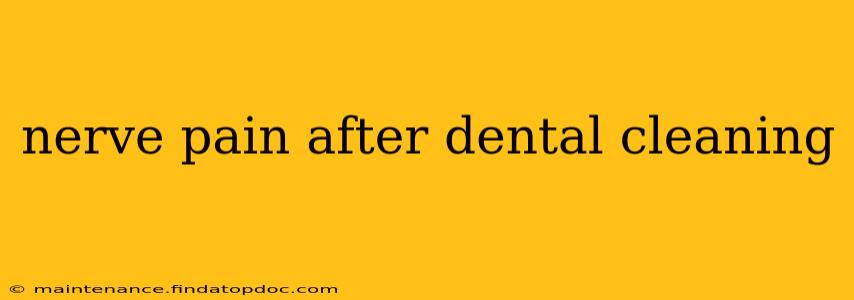Dental cleanings are essential for maintaining oral health, but sometimes, they can lead to unexpected consequences like nerve pain. This discomfort can range from mild tingling to severe, sharp pain, and it's crucial to understand the potential causes, effective treatments, and preventative measures. This comprehensive guide will address common questions surrounding nerve pain after a dental cleaning, helping you navigate this often unsettling experience.
What Causes Nerve Pain After a Dental Cleaning?
Nerve pain following a dental cleaning is usually temporary and resolves on its own within a few days. However, several factors can contribute to this discomfort:
- Inflammation: The cleaning process, especially if it involves deep scaling or root planing, can cause inflammation of the gums and surrounding tissues. This inflammation can put pressure on nearby nerves, resulting in pain.
- Trauma to the Nerve: While rare, accidental damage to a nerve during the cleaning procedure is a possibility. This could involve direct contact with a tool or excessive pressure during scaling.
- Infection: In some cases, the cleaning process might inadvertently expose underlying infection. This infection can cause inflammation and subsequently trigger nerve pain.
- Existing Underlying Conditions: Pre-existing conditions like trigeminal neuralgia or other nerve disorders can be exacerbated by the manipulation of tissues during a cleaning.
- Sinusitis: Pain originating from the sinuses can sometimes be misinterpreted as tooth or nerve pain, especially in the upper jaw area.
Is Nerve Pain After a Dental Cleaning Normal?
While not "normal" in the sense that it shouldn't be expected, experiencing some mild discomfort or temporary sensitivity after a dental cleaning is relatively common. However, persistent or severe pain is not normal and requires immediate attention from your dentist. The level of sensitivity depends on several factors including the depth of cleaning required, individual sensitivity, and the presence of any pre-existing conditions.
How Long Does Nerve Pain After a Dental Cleaning Last?
The duration of nerve pain varies considerably depending on the cause and individual response. For most individuals experiencing mild discomfort, the pain subsides within a few days. However, if the pain persists for more than a week, or intensifies, it's essential to seek professional dental care. In some cases, particularly those involving nerve damage, recovery might take longer, potentially requiring specialized treatment.
What Can I Do to Relieve Nerve Pain After a Dental Cleaning?
Several home remedies can provide temporary relief from mild nerve pain:
- Over-the-Counter Pain Relievers: Nonsteroidal anti-inflammatory drugs (NSAIDs) such as ibuprofen or naproxen can help reduce pain and inflammation. Always follow the recommended dosage instructions.
- Cold Compress: Applying a cold compress to the affected area can help reduce swelling and numb the pain. Apply for 15-20 minutes at a time, several times a day.
- Saltwater Rinse: Gently rinsing your mouth with warm salt water can help cleanse the area and reduce inflammation.
- Soft Foods: Stick to soft, easy-to-chew foods to avoid putting excessive pressure on the sensitive area.
When Should I See a Dentist About Nerve Pain After a Dental Cleaning?
You should consult your dentist immediately if:
- The pain is severe or persistent (lasting longer than a week).
- The pain radiates to other areas of your face or jaw.
- You experience numbness or tingling in your mouth.
- You develop swelling or redness in your gums.
- You have a fever.
These symptoms could indicate a more serious problem requiring immediate professional attention.
Can Nerve Damage From a Dental Cleaning Be Permanent?
While nerve damage from a dental cleaning is rare, it's not impossible. Permanent damage is even less common. However, if nerve damage does occur, the recovery time can vary significantly and may require specialized treatment from a dentist or oral surgeon. Early intervention is key to minimizing long-term complications.
How Can I Prevent Nerve Pain After a Dental Cleaning?
While it's not always possible to completely prevent nerve pain, you can minimize the risk by:
- Communicating with your dentist: Discuss any concerns or past experiences with sensitivity before the procedure.
- Proper oral hygiene: Maintain excellent oral hygiene to minimize the need for deep cleaning.
- Regular dental checkups: Regular checkups can help detect and address potential problems early on, reducing the need for extensive cleaning procedures.
This information is intended for educational purposes only and does not constitute medical advice. Always consult with a qualified dental professional for any concerns regarding your oral health.
